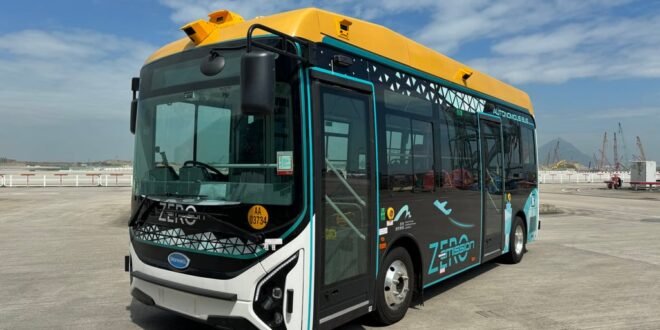Addressing AI Governance and ESG Challenges in Hong Kong
The recent incident involving two driverless buses colliding at an intersection at Hong Kong International Airport has sparked a critical conversation about the city’s approach to artificial intelligence (AI) governance. Although no injuries were reported and the damage was minimal, the collision highlights a significant gap in the oversight of autonomous systems. The Airport Authority’s decision to suspend the service underscores the fragility of public trust when it comes to emerging technologies.
According to the authority, both buses arrived simultaneously at an uncontrolled junction, and their sensors failed to coordinate a right-of-way decision—a known edge case in autonomous systems. This incident is not an isolated one but rather a reflection of broader challenges in ensuring the safety and reliability of AI-driven solutions.
Hong Kong is investing heavily in AI, from supercomputers to smart traffic systems. However, investment alone is not enough; effective leadership requires robust governance structures. Unlike the European Union’s AI Act, which classifies autonomous buses as “high-risk” systems and mandates strict compliance measures, Hong Kong relies primarily on guidelines. There is currently no legal obligation for operators to follow internationally recognized protocols for pre-deployment testing or third-party audits of AI safety.
Had ISO 42001 certification been required, the operator would likely have implemented continuous monitoring to detect and resolve sensor conflicts before deployment. Under the EU AI Act’s risk-based framework, real-time human oversight would be mandatory for systems of this kind. While Hong Kong does not need to adopt the full legal text of the EU AI Act, aligning with its risk-based approach would ensure that safety-critical AI systems meet minimum performance, transparency, and accountability benchmarks.
These frameworks transform reactive pauses into proactive prevention. International partners take notice when cities govern AI through ad hoc reactions rather than certified systems. To address these concerns, Hong Kong must adopt risk-based classification for critical infrastructure, mandate ISO 42001 certification for public-sector AI systems, and link innovation funding to compliance. These steps would not stifle progress; they would accelerate it by providing clear rules, verifiable safety, and enhanced credibility.
The collision was not solely a failure of technology but also a governance shortfall that can be fixed. As Hong Kong positions itself as an AI hub, it must lead where it counts by building trust through enforceable standards.
Supporting SMEs in Overcoming ESG Hurdles
The ESG (environmental, social, and governance) road map for logistics recently released by the Transport and Logistics Bureau is a crucial step toward sustainable development in Hong Kong. However, a survey conducted by the Chartered Institute of Logistics and Transport in Hong Kong reveals significant challenges that need addressing.
The survey of 213 industry professionals highlights a stark implementation gap. While large organizations with more than 500 employees demonstrate higher ESG implementation rates than smaller firms, nearly half of the surveyed companies lack dedicated ESG resources. This disparity threatens to create a two-tier industry where smaller players struggle to meet evolving sustainability standards.
Three critical barriers identified in the survey include limited financial resources (72% of respondents), lack of qualified expertise (69%), and complex regulatory requirements (66%). These challenges particularly affect small and medium-sized enterprises (SMEs), which form the backbone of Hong Kong’s logistics sector.
Despite these challenges, the survey also reveals encouraging trends. Three-quarters of respondents recognize that ESG implementation can increase business opportunities, while 71% believe it reduces business risks. This indicates that the industry understands the importance of ESG but needs support to overcome implementation hurdles.
To address these challenges, the government should consider three key initiatives: establishing a consortium programme allowing smaller companies to pool resources and share best practices, creating a comprehensive training curriculum with industry certification programmes, and developing financial support mechanisms such as grants and tax incentives scaled to company size.
The logistics sector’s ESG transformation is vital for Hong Kong’s sustainable development and international competitiveness. With European and North American organizations showing greater success in ESG implementation than their Asian counterparts, Hong Kong must act decisively to maintain its position as a leading logistics hub.
Saving Small Shops Through Collaboration
Amidst the focus on Hong Kong’s success in attracting international finance, the situation for small and medium-sized enterprises (SMEs) appears to be deteriorating. Several long-standing restaurants and retail shops have closed, leaving premises vacant. There is growing concern that landlords are refusing to lower rents, creating a vicious cycle that makes it difficult for SMEs to survive.
One reason for not lowering rents is the fear that lower rents could lead to lower property values. However, if banks and authorities could work together, it might be possible to reduce retail rents and allow SMEs to compete with shops elsewhere. Renting out a property is surely more sensible than leaving it vacant and waiting for better times.
Common sense should prevail in this situation, as the survival of small shops is essential for maintaining the city’s diverse commercial landscape. By fostering collaboration between banks, landlords, and the government, Hong Kong can help ensure the continued vitality of its local businesses.
 Info Malang Raya Its All About World News
Info Malang Raya Its All About World News




